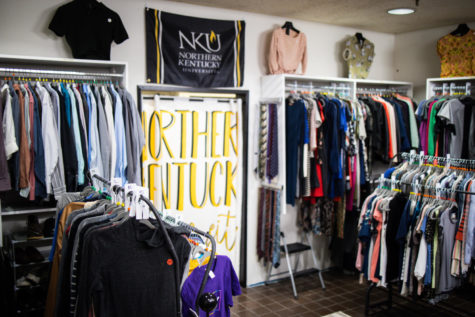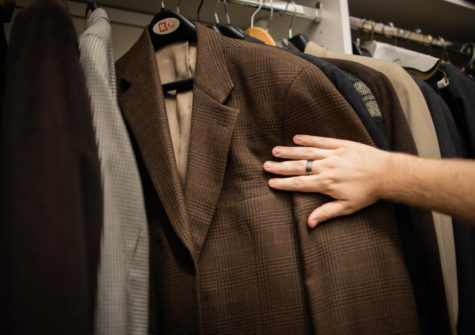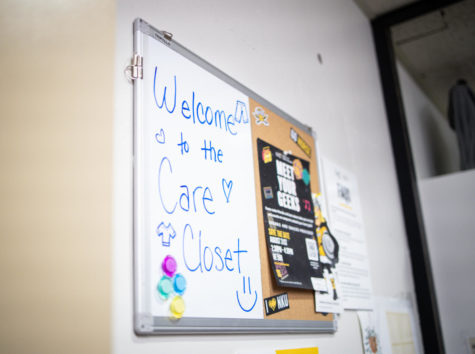More than free fashion: Care Closet seeks to enhance lives of all students
September 19, 2022

Countless racks of trendy and timeless fashion fill the corner of University Center 142 with life. The garments patiently hang on the racks, waiting to be hand-picked and worn by students. Professional suits and sport coats, graphic tees and workout attire are amongst the mix of neatly organized and easily accessible clothing items.
The Care Closet is a university resource that provides free clothing to all students, no matter their financial status. NKU’s clothing resource is part of the Care Closet parent organization in Newport, Ky. This branch helped supply the university’s start-up of the program in 2021, according to the Institute for Health Innovation Director Carolyn Noe.
The idea for the Care Closet blossomed within the Institute for Health Innovation after the introduction of FUEL NKU, a free food pantry for NKU students. Noe was struck by the mission behind FUEL, which suggested that if food insecurity was an issue, finding affordable clothing was also a likely issue.
“If students aren’t having their basic food needs met, to me that means they’re probably not able to buy clothes either, or at least not able to buy a lot of clothes that might come with something like an internship,” Noe said.
Before the launch of the Care Closet, Noe explored similar resources at other universities. She found that many organizations had a like-minded mission, but their resource supply fell short. Students at these universities would be restricted to one or two items only, which she felt was not enough, especially for full-time internships or jobs.
The Care Closet has no set limitations on how many items a visitor is allowed to take home, but Coordinator Peyton Anderson softly recommends leaving with two to three bags, which typically include ten to twenty items of clothing, two to three pairs of shoes and a backpack or briefcase. These items can be a mix of professional clothes as well as casual wear, as the space maintains about fifty percent of both categories at all times.

Noe recognizes that college is a costly venture for all students, who endure a never-ending cycle of tuition, housing and food prices that are not going down any time soon. High quality fashion items come at a high price, and students deserve to feel like their best self inside the classroom and when entering the career field.
Anderson recalled her own feelings of concern about affording basic needs, much less new clothing.
“When I was in college we did not have the Care Closet here at NKU. There were definitely times that I remember feeling like, ‘Oh my gosh, how am I going to afford groceries? How am I going to afford clothes?’ I think that there’s almost this natural shame, and so I think that places like the Care Closet and FUEL NKU provide sort of a normalization of the need for these things,” Anderson said.
The organization works closely with LGBTQ+ services, offering a safe space for students to come in and pick clothes that suit their bodies and preferences. The organization understands the cost of buying a new wardrobe to match one’s identity can be overwhelming for college students.
Students with children or families to care for can also receive clothing for these individuals. Any need that is not met with the Care Closet’s current supply can be fulfilled by the Newport branch, which specializes in assisting children and impoverished families.
Matthew Waits, the Care Closet’s Assistant Coordinator, pointed out the privacy and judgment free nature of the space. He encouraged all students to check out the resource without a second thought. He feels that men on campus are an unreached demographic for the Care Closet, which could stem from their stigma against accepting help.
“If you come in here, the only person that’s going to know that you came in here is me, and I can’t remember their faces,” Waits said.

NKU student Steve Halpin is a testament to the value of the Care Closet, who has returned to college at fifty years old. Halpin made a point to turn his life around after being released from prison, becoming a Christian, securing a job and finishing his college degree. Returning to the university setting was an overwhelming experience for Halpin at first, but he soon found the resources he needed to succeed.
Halpin recalled walking into the University Center in pursuit of the Learning Center and just so happening to look over at the Care Closet. He has since visited the resource on at least three different occasions, finding new items with each visit. His catering company job requires white dress shirts, black pants, black ties, and shoes, all of which he gathered from the Care Closet.
For Halpin, the friendliness of staff members like Waits has impacted his college experience. He encouraged students to not cheat themselves out of a valuable resource and left a message for those who are struggling to accept the Care Closet’s gratuity.
“I would tell people to not be ashamed to come in here because they will always have their opportunity to give back when they’re on their feet,” Halpin said.
Waits also pointed out that a lack of clothing supply is an unforeseeable issue for the Care Closet. The organization receives an influx of new clothing daily, which can be from the Newport branch or select donations from faculty, staff and some students. One of the challenges, Waits said, is actually having too many clothes and not enough takers.
Anderson reassured students who may not be struggling financially but could still use the support to just come in.
“In the same way that FUEL has a constant stream of food coming from Kroger, we’re the same way. So even though our space looks small and you might be like, ‘Oh no, I’m taking all three of the sweatshirts that are out, chances are we have like 150 other sweatshirts that are just not out. I always try to tell students the minute that you’re done shopping, we will replenish whatever you’ve taken,” Anderson said.
Students have options for how they choose to visit the Care Closet. Walk-in hours are available each weekday, and appointments are offered on Mondays, Wednesdays and Thursdays. Students interested in making an appointment simply visit the organization’s website, fill out a brief appointment request form and come in at their scheduled time. The request form asks basic questions, like the student’s size, preferred fashion styles and the purpose of the appointment. With this information, the Care Closet staff is able to pull suggested items for the student and, if needed, seek out additional garments from the Newport organization.
Waits spoke of the personal fulfillment he gets in serving students, especially in special circumstances when the resource they provide is truly life-changing. For anyone considering seeing what the Care Closet is all about, Waits says there’s no better time, and if you’re hesitant to take from the resource, just bring a donation with you.
